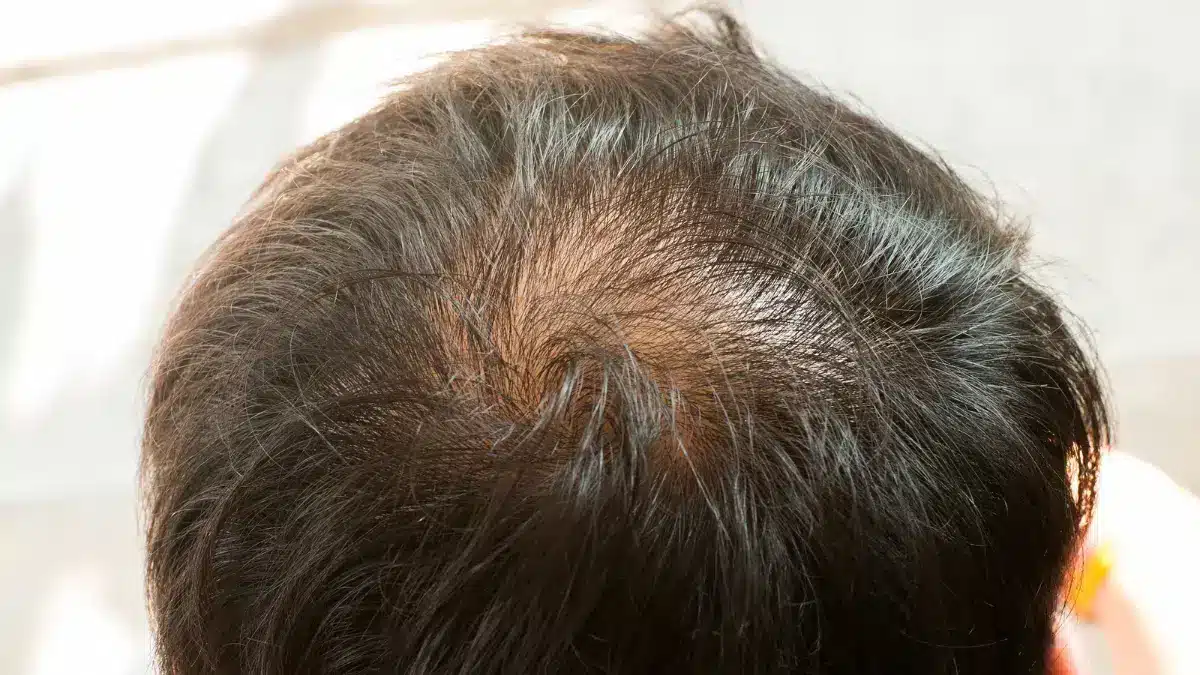HIV Hair Loss: Examining the Relationship
Hair loss is a common concern for many individuals, and various factors can contribute to its occurrence.
One question often arises is whether HIV, the Human Immunodeficiency Virus, can cause hair loss.
HIV is primarily known for its impact on the immune system, but its effects on other body parts, including hair follicles, have been researched and discussed.
This article will explore the relationship between HIV and hair loss, examining the scientific evidence to understand this topic comprehensively.
Study on HIV hair loss
Research on the correlation between HIV and hair loss has produced mixed results.
Some studies suggest that hair loss can occur due to HIV infection.
A research was done on ten patients with HIV-1 infection in 1996 to find the correlation between HIV and hair loss.
It states that each patient was diagnosed with Telogen Effluvium, with telogen count ranging from 24% to 50%.
Telogen Effluvium is one of the most common causes of hair loss that involves excessive hair shedding.
Another study shows that HIV is one of the medical conditions that can cause Telogen Effluvium.
Symptoms of HIV hair loss
HIV does not directly cause hair loss.
However, the medical conditions induced by HIV, such as Telogen Effluvium and Alopecia Areata, can result in visible symptoms, including.
Patchy hair loss
Some individuals with HIV may experience patchy hair loss, known as Alopecia Areata.
This condition is characterized by smooth and circular patchy hair loss around the scalp or other regions of the body.
Thinning hair
Hair thinning or a gradual decrease in hair density may occur in individuals with HIV.
This can lead to overall hair loss and a noticeable reduction in hair volume.
Brittle or fragile hair

HIV-related hair loss can cause the remaining hair to turn brittle, dry, and more prone to breakage.
The hair may feel weak and easily damaged, leading to further hair loss.
Receding hairline
Some individuals with HIV may notice a receding hairline, especially in men.
The hairline may gradually move backward, resulting in a more prominent forehead and thinner hair along the front.
Body hair loss
In addition to scalp hair loss, individuals with HIV may experience hair loss in other body parts.
This can include the eyebrows, eyelashes, facial hair, and body hair.
What causes hair loss in HIV?
Hair loss in individuals with HIV can have various causes.
Here are some common factors contributing to hair loss in people with HIV.
Antiretroviral Therapy (ART) side effects
ART includes the treatment of HIV patients to reduce the replication of the HIV virus.
Certain medications used in ART, particularly some Protease inhibitors, have been associated with hair loss as a side effect.
However, not all Antiretroviral drugs cause hair loss, and the prevalence of this side effect can vary among individuals.
Nutritional deficiencies

HIV infection can lead to nutritional deficiencies, mainly if there are issues with appetite, poor dietary intake, or problems with nutrient absorption.
Deficiency in essential Minerals and Vitamins, such as iron, zinc, vitamin D, and biotin, can contribute to hair loss.
Telogen Effluvium
The emotional and psychological stress associated with an HIV diagnosis and the challenges of living with the virus can trigger this condition.
This occurs when many hair follicles enter a resting phase prematurely, resulting in excessive shedding.
Hormonal imbalances
Hormonal imbalances, such as Androgen (male hormone) level fluctuations, can contribute to hair loss in individuals with HIV.
Hormonal changes can affect the hair growth cycle, leading to increased shedding and thinning of the hair.
Please readHormonal Hair Loss: Take a Closer Look.
Inflammatory condition
HIV infection can cause chronic inflammation in the body, including the scalp.
Inflammation of the hair follicles might disturb the hair growth cycle, contributing to hair loss.
Treatment options for HIV hair loss
Treatment of HIV hair loss will differ with respect to the root cause and the patient’s needs.
Here are some potential treatment approaches that can be considered.
Medication adjustment
If hair loss is suspected to be a side effect of specific Antiretroviral medications, a healthcare professional may consider adjusting the treatment regimen.
This may involve switching to alternative medications with a lower risk of causing hair loss.
Nutritional support
Addressing nutritional deficiencies is crucial in managing hair loss associated with HIV.
Ensure adequate intake of essential vitamins, minerals, and nutrients that promote healthy hair growth.
Stress management
Managing stress levels is essential, as stress can contribute to hair loss.
Engaging in stress-reducing techniques such as exercise, meditation, yoga, or counseling can help minimize stress-related hair loss.
Hair Transplantation
Hair transplantation may be an option in cases where significant hair loss has occurred.
This procedure involves moving hair follicles from areas with average hair growth to areas with hair loss.
Conclusion
Hair loss is a concern for individuals living with HIV, and understanding the causes and treatment options is crucial in managing this condition.
While HIV infection may not directly cause hair loss, various factors associated with the virus can contribute to hair loss in affected individuals.
Factors such as side effects of antiretroviral therapy, nutritional deficiencies, hormonal imbalances, inflammation, and stress can cause hair loss.
Recognizing and addressing these factors can help manage and minimize their impact.
Treatment approaches may involve adjusting medication, addressing nutritional deficiencies, managing stress levels, and in some cases, hair transplant.
It is vital for individuals with HIV experiencing hair loss to consult with healthcare professionals or dermatologists specializing in hair loss.
They can thoroughly evaluate, determine the underlying causes, and recommend personalized treatment options based on individual needs.
Frequently Asked Questions
WowRx uses only high-quality sources while writing our articles. Please read our content information policy to know more about how we keep our content reliable and trustworthy.






